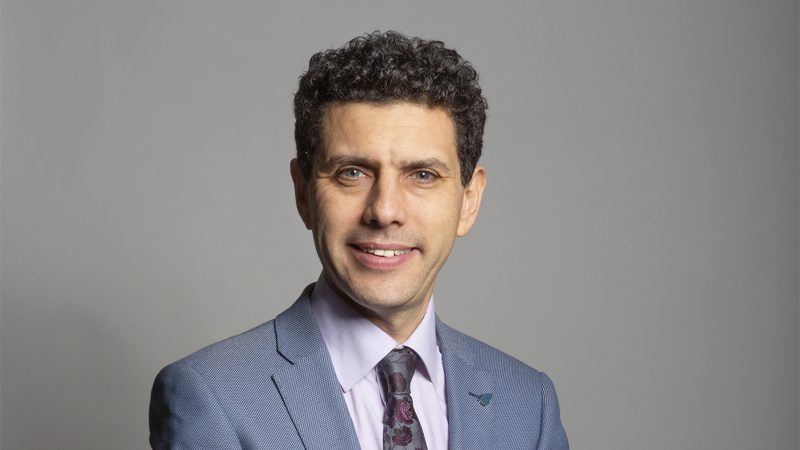
The theme of this year’s Holocaust Memorial Day is ordinary people. Ordinary is often used as shorthand for people who are neither rich, nor famous. But most people do extraordinary things at some point in their life, and that is especially true in times of crisis.
My family lived through the Holocaust in Ukraine. My family were ordinary people who lived and died in extraordinary, terrible times. Hearing their stories growing up means I recall the names of various towns and cities in Ukraine. Places like Lviv, Dnipro, Makeyevka and Kryvyi Rih.
This Holocaust Memorial Day, I want to tell you the story of my great-grandfather David and his daughter Miriam. David ran a pub in Lviv. He had two daughters, named Salk and Fanka, both of whom disappeared during the German occupation of the city. He also had a boy called Zygmunt, who everyone knew as Mundek, and two younger girls: my grandmother Regina and her sister, my great aunt Miriam.
In September 1939, the Soviet Army occupied the western part of Ukraine. The pubs owned by Jews like David were closed down. But he survived with the help of his family, and Miriam got a good job with a Soviet vodka company. All of my relatives avoided the gulag. In June 1941, Nazi forces occupied Lviv, and the persecution of Jews began. My family left their home and left any valuables with sentimental value with the caretaker of the building, a Polish woman named Mrs Habdas.
The Germans soon ordered all the Jews of Lviv to move to the Ghetto, then to Janowska concentration camp. Others were transported to Belzec extermination camp, where half a million Jews are estimated to have been gassed. Many Roma, Sinti and others deemed subhuman by the Nazis were murdered alongside them.
Zygmunt found a job at a German car repair company, alongside his cousin Leon. Miriam was forced to take a job at the Rudolf Weigl Institute, where an experimental vaccine was being developed. Her role was as a human source of blood for lice infected with typhus. The experimentation had a lasting effect on her life and health, and she was unable to have children.
David also needed a job, to obtain the coveted ‘life number’ that protected Jews from certain death. Miriam and Zygmunt managed to find David a job collecting hair from the floors of hairdressers. The owners took bribes to let Jews work. If they collected enough hair they received the ‘life number’, and a chance of survival.
Miriam sold everything to pay the Nazi bribes. When she ran out, she visited Mrs Habdas to collect the items left with her for safekeeping. But Mrs Habdas told Miriam to leave and threatened her with the SS. My family could no longer pay the bribes, and my great-grandfather David was murdered in Belzec extermination camp. Regina and Miriam survived the war. I was fortunate enough to know both women growing up, and they influenced me greatly.
The invasion of Ukraine has caused the greatest humanitarian crisis in Europe since the Second World War. Like the Nazis, Russian forces are set on eradicating the identity of a people. They see LGBT rights as an existential threat and have made war crimes their standard practice.
But today, we also have a new generation of ordinary people doing extraordinary things. A new generation of people holding back a new fascist force, albeit one with old, ugly ideas.
I recently met Mariia Donets, who fled Kyiv with her nine-year-old sister. “I wasn’t going to leave, but then I just had to grab it and go. I didn’t pack a single T-shirt, but had three dresses. I was so unprepared,” she said, adding: “Instead of being on a train for ten hours, we were on it for 36. We had to constantly stop for air raids.”
She now lives in the UK and works for the Goncharenko centres, providing access to free, quality education for Ukrainians. She organises aid convoys and is working with me and other parliamentarians to take aid to Ukraine next month. An ordinary Ukrainian doing extraordinary things.
Lesia Vasylenko – my counterpart in the Rada – told me about her friend Masi Nayem. Masi came from Afghanistan to Ukraine as a child. He fought as a volunteer in 2014 and again in 2022. But whilst out on a mission last year his unarmoured vehicle was hit. He lost an eye. He looked death in the face with two eyes, and now looks at life only with one.
Maria and Masi are just two examples of millions of brave Ukrainians. The people of Ukraine did extraordinary things during the Holodomor and again through the Holocaust. Now, faced with the horrors of a new genocide, they do so again. Slavia Ukraini!




More from LabourList
‘SEND reforms are a crucial test of the opportunity mission’
Delivering in Government: your weekly round up of good news Labour stories
Labour place third in Gorton and Denton by-election as Greens gain seat